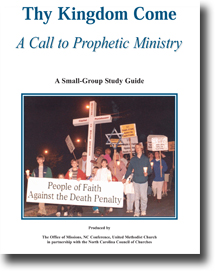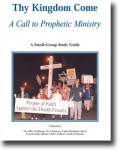
This study guide addresses the presence and practice of love and justice in nine domains within our life together in North Carolina. They are: health care, housing, jobs and wages, race, criminal justice, education, the earth, government and citizenship, and sustainable communities. Each chapter gives a UMC Social Principle for that topic. These biblically based standards remind us of the responsibility to seriously apply our faith in the world of laws, policies, and economic and social systems. In order to better understand these systems, each chapter has biblical reflections, facts, personal profiles, resources, and questions for your consideration. The publishers and authors of this guidebook hope and pray that it will provide spiritual inspiration and insight, leading to an even greater sense of social responsibility and action throughout the NC Conference of the United Methodist Church and beyond.
From the Introduction:
The Lord’s Prayer conveys to all who would follow Jesus some key teachings on how we, as humans, are to approach and act toward God and toward one another. Jesus taught us to pray for the kingdom of God to come and for God’s will to be done, on earth as it is in heaven. We are to ask God to give us our daily bread–in order that we may live according to our basic needs, not our shaped desires. Having our daily bread, we are then free to pay attention to issues weightier than only our own hunger and survival. Jesus in this prayer also teaches us to ask for forgiveness. We are to develop a discipline of receiving our forgiveness from God, then of forgiving others for the harm they have done to us. Jesus adds that we should ask God not to lead us into temptation. Other spirits and pressures do that very well (thank you) and we have had enough of that already (like Jesus had). Finally, we are to end the prayer by affirming God’s eternal power and glory.
In his life and mission, Jesus saw himself as actively preparing and serving the kingdom of God on earth, to be as it is in heaven. He saw all of his disciples in the same light and as having the same purpose. Nowhere in the prayer instructions of Jesus is the focus on getting the earth–or ourselves–to heaven. The heart of the Lord’s Prayer is a request for heaven on earth. While this difference may seem subtle, its truth is at the very center of the call and practice of prayer and discipleship.
Many Christians interpret the Lord’s Prayer as a call for heaven to come, once and for all, in all its glory. This interpretation misses Jesus’ point. The Kingdom of God comes to earth, and is both within us and among us whenever our hearts and minds, our loving and just words and deeds, our forgiven and forgiving ways, exude and express the love of God. The kingdom of God is like that mustard seed of love that grows when it is watered and withers when it is neglected or dies. Like the mustard seed, the kingdom of God is an “annual,” not a “perennial.” It is not permanently established; it comes and goes with the presence of love and justice in our lives and in the habits of our communities and societies. If we fail to understand that the very purpose of salvation is to do good works (Ephesians 2:10), our faith quickly becomes otherworldly, individualistic, self-righteous, and void of responsibility in and to society.
Jesus calls us to love God and our neighbor (Luke 10:27). For many of us, it is easier to love God than to love our neighbor. The attitudes and behavior of our neighbors can make it tough for us to love them! But we also face a second challenge: if we don’t love ourselves, then it is also hard for us to love our neighbor as ourselves. We’re sent back again to the Lord’s Prayer and Jesus’ emphasis on forgiving ourselves and others, as the primary indicator of the presence of God’s kingdom in both our lives and society.
Loving our neighbor involves changes in our own attitudes and behavior. It means moving past individual care, to determining how the kingdom of God can be structured on earth according to the principles of loving “thy neighbor as thyself.” It means promoting social systems that are righteous and just–that truly “do right” by and for our neighbors, as well as by and for ourselves. Naturally, we are involved most with our own families and the people in our local circles of concern. Jesus asks us to enlarge those circles, and strive for what is right and just for distant others as much as we strive for what is right and just for ourselves.
The reason the biblical requirement to do justice (Micah 6:8) is so difficult is that it requires much more than mere affection. Justice requires a sacrifice of one’s own self-interest to meet the needs of others. This is the practical consequence of loving our neighbor as ourselves. Justice involves the balancing and rebalancing of human interests in order to better serve the fulfillment of all people.
The symbol for justice in our society is the scale of weights and balances. When injustice burdens individuals and groups of people, we can rebalance the scales and tip them the other way. An injustice done can never be taken back, but it can be redressed and balanced. We can remove the weight of opportunities denied and shift it to the side with excessive privilege. While this may seem unfair from the perspective of self-interest and the loss of heightened status, it is fair from the perspective of self-sacrifice and increased privilege for those once denied. Again, knowing that God forgives us, frees us to forgive ourselves and others. This opens the door so we can live freely, do justly, love mercifully, and walk humbly with God.
Justice involves promoting human responsibility and protecting human rights among all people. It also involves being good stewards of the earth and protecting our environment from human abuse and neglect. Through love, we can achieve justice voluntarily. However, as humans we often resist sacrificial love. Further, we hold differing opinions about justice; so we resort to legal decrees to administer it according to our state and national laws. As Christians, our first call is to follow God’s love and justice as we discern it together. We are called to deny ourselves, follow Jesus, and take up our crosses daily (Luke 9:23). We are called to constantly let go of our self-interest and prejudices. We are to enter into human community and conflict with mercy and humility, seeking to protect and promote what is right and just for all people.
When speaking of the hypocrisy of the scribes and Pharisees, Jesus says: “You have shut the kingdom of heaven against people; for you neither enter yourselves, nor allow those who would enter to go in” (Matt. 23:13-14). Jesus rebuked the Pharisees for nitpicking about their status, food cleanliness, temples rituals, and such; instead, he called them to “weightier” matters of “law, justice, mercy, and faith” (Matt. 23:23). Jesus clearly implies that the doorway to the kingdom of God is open to us at every moment, here and now. We neither create nor initiate God’s kingdom. Our choice each moment is to either enter its door or shut it against others and ourselves.
The miracle of the Gospel is this: That when we give ourselves away, when our energy, our creative spirit, our very existence is lived for the other, it is then, and only then, that we too are healed, that we too can have life abundantly. It is not a magical occurrence; rather, it is because we make God’s kingdom our first priority, a kingdom where the sojourner is welcomed, the oppressed are lifted up, the blind have sight, the imprisoned are liberated, where all know that this is the year of God’s favor. This is good news, indeed. If we seek justice, if we love kindness, if we walk humbly with God, if give ourselves over to the love of Christ that refuses to exclude, we will enter the kingdom, on earth, as it is in heaven. Amen.
The Rev. Mac Legerton, Executive Director, Center For Community Action, Lumberton, NC.

